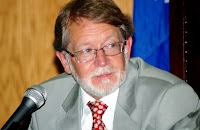The real question remains;
What can you do if you are affected and how can you prevent your test from being botched in the future?
In the case of the breast cancer tests that are the center of the controversy, it's important to understand that;
That's a pretty scary statement. I bet your doctor didn't tell you that little fact when you received your diagnosis and your treatment regimen.In 20 to 30 per cent, there are disagreements between labs and individuals on whether a result is negative or positive because of variables in technique and interpretation, said Jared Schwartz president of the College of American Pathologists, a world authority on lab quality control and accreditation.
"The problem is there is no gold standard anywhere on how you call a specific test positive or negative," Schwartz said, also co-chair of an international team that's developing universal guidelines on process and criteria that pathologists will use.-The Gazette
Perhaps we should all be mindful of the Russian proverb and heed it's advice;
"doveryai, no proveryai" - “Trust but verify.”
Remember;
"About 85 per cent of decisions that doctors make about the diagnosis and treatment of their patients are based on lab tests," said Nathalie Rodrigue, president of the Ordre professionnel des technologists médicaux du Québec." - -The GazetteNow the government isn't saying which labs have screwed up and isn't unlikely to do so. All labs are not alike, some better and some worse.
In the case of a serious illness, I'd certainly pay for a second test out of my own pocket, regardless the cost and I'd send the sample to a top notch lab.
How to differentiate between the good and the sloppy?
There are standards. The College of American Pathologists (CAP) does accredit labs that have achieved and maintain the highest possible standards.
"The CAP Laboratory Accreditation Program is an internationally recognized program and the only one of its kind that utilizes teams of practicing laboratory professionals as inspectors. Designed to go well beyond regulatory compliance, the program helps laboratories achieve the highest standards of excellence to positively impact patient care.The program is based on rigorous accreditation standards that are translated into detailed and focused checklist questions. The checklists, which provide a quality practice blueprint for laboratories to follow, are used by the inspection teams as a guide to assess the overall management and operation of the laboratory." LINK
| C.D.L Medical Laboratories Inc | ||||||||||||
| 5990 Chemin de la Cote des Neiges | ||||||||||||
Montreal, QC - H3S1Z5
|




